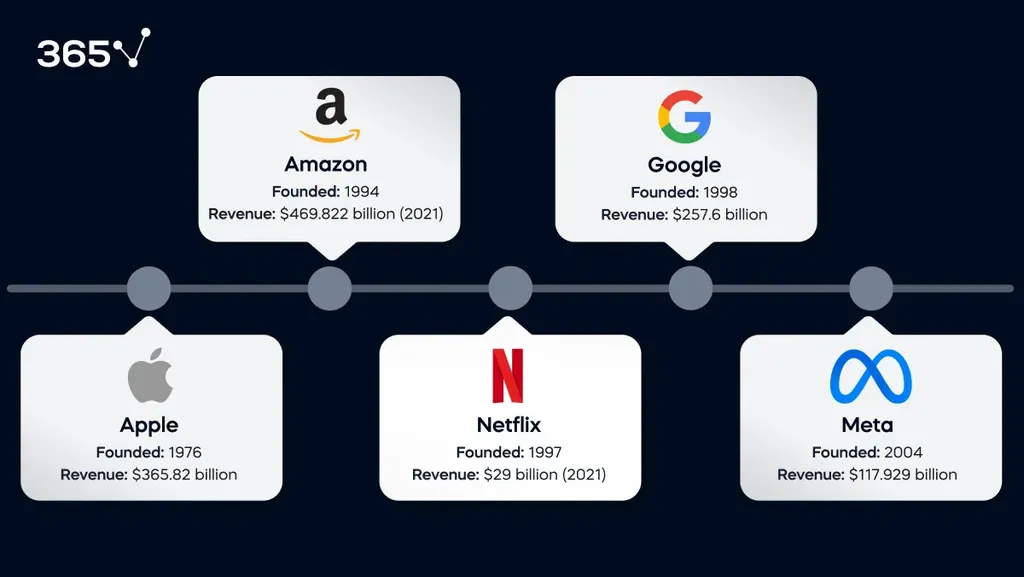Data science has become an integral part of success in nearly every industry. As such, good data scientists should have not only technical skills, but domain expertise too. For example, a data scientist working in the financial sector would need a firm grasp of financial terms and trends in the field. Similarly, a data scientist working in Big Tech companies should know the ins and outs of the industry giants.
So, we’ll begin this article with an overview of the world of big tech. We’ll provide some background about the Tech Giants and the role of data scientists in these companies.
Next, we’ll provide real-life use cases of data science in Google, Amazon, Netflix, Apple, and Meta. Then, we’ll explain how to become a data scientist at a big tech.
As usual, we’ll end with a resources section that will guide you on your path to becoming a successful data scientist in big tech.
Let’s dive in.
How to Become a Data Scientist at a Big Tech Company: Table of Contents
- What is Big Tech?
- Big Tech Companies
- What Does a Data Scientist Do in a Big Tech Company?
- Applications of Data Science in Big Tech Companies: Examples
- How to Become a Data Scientist at a Big Tech Company
- Useful Resources
- How to Become a Data Scientist at a Big Tech Company: Next Steps
What Is Big Tech?
The term “Big Tech” refers to the largest, most successful tech companies in the United States, and for the most part, globally. You can also see them mentioned as the Big Four, Big Five, the Tech Giants, the Four Horsemen, and many other names.
They operate in and dominate various industries – e-commerce, consumer electronics, streaming services, etc. Naturally, they are very desirable and often considered the top companies for data scientist and other professionals.
The term was coined around 2013, with the rise in big data and the noticeable dominance of certain businesses on the market. That said, it was not widely popularized until the investigations of the involvement of some of these companies in the 2016 US presidential elections.
So, which are the infamous best companies for data science specialists?
In 2013, the Four Horsemen of Big Tech were Google (Alphabet), Amazon, Facebook (Meta), and Apple, or GAMA, for short. Microsoft goes on and off that list as the fifth member of the Big Five – depends on who you ask. Television host Jim Cramer added Netflix to the equation, popularizing the acronym FAANG.
As you can see, there are many variations of the big tech group. To account for them all, a 2021 article in The Motley Fool jokingly called them MANAMANA. Well, jokes aside, the Muppet acronym does include all candidates for the Big Tech spot – Microsoft, Apple, Netflix, Alphabet, Meta, Amazon, Nvidia, and Adobe. Some people consider Twitter, Oracle, Salesforce, and others to be big tech firms as well.
But we’re not here to solve the debate. For simplicity, we’ll focus on the FAANG companies. That said, the guidance we provide on how to get a data science job in big tech applies to all names mentioned above.
Big Tech Companies
Before you start applying for data science jobs at the Big Five, you’ll need to do your research and learn as much as you can about them. To help you get started, we’ll provide a brief overview of the FAANG companies.
Meta
Facebook (now Meta) was founded in 2004 by Mark Zuckerberg as a social media networking platform. Gradually, it became one of the leading tech companies.
With over 71,970 employees and a total revenue of \$117.929 billion in 2021, Meta provides a variety of services and products to the entire world.
The technology company owns Facebook, WhatsApp, Messenger, Instagram, and other businesses, such as Reality Labs (formerly, Oculus) which provides virtual reality software and hardware.
Meta relies heavily on big data analytics to improve customer experience and its marketing techniques. The median data scientist salary at Meta is \$194,507 per year (base pay and additional compensation included).
Amazon
Founded in 1994 by Jeff Bezos, Amazon is constantly evolving and expanding. It progressed from an online marketplace for books to one of the most influential names in the e-commerce world. Nowadays, it has around 1,608,000 employees and a total revenue of \$469.822 billion in 2021.
The e-commerce giant uses big data to build a personalized recommendation system based on behavioral analytics. Data scientists also play a crucial role in developing its anticipatory shipping model that predicts the details about a customer’s purchase.
With a median total pay of \$162,577 per year, Amazon is one of the top companies for data science specialists.
Netflix
Founded in 1997 by Reed Hastings and Marc Randolph, Netflix is considered one of the best production companies providing streaming services.
It has over 220 million subscribers and 11,300 employees globally. The company generated \$29.7 billion in revenue in 2021 and is ranked number 115 on the Fortune 500 list.
Big data plays a crucial role in Netflix's success. Just like Amazon, the streaming platform uses big data analytics to build personalized recommendation systems for its users. More significantly, it implements custom marketing based on the huge amounts of data users generate every day.
Unsurprisingly, data scientists’ earnings reflect the important role they play. The average data scientist salary at Netflix is \$164,977 per year.
Google was founded in 1998 by Larry Page and Sergey Brin as a search engine technology tool. Now, it is one of the industry leaders in cloud computing and artificial intelligence. It produces a long list of products, from search tools to operating systems and hardware.
Its parent company’s revenue for 2021 was \$257.63 billion, the majority of which came from Google’s advertising segment of the business. Alphabet employs over 156,500 people.
Being the most popular web-based search engine, Google was among the first companies to use big data to its advantage. It implements it to improve results, innovate products, and provide big data solutions for businesses and individuals through the Google Cloud Platform.
Being one of the best companies for data science professionals, Google offer an average total pay of \$206,752 per year.
Apple
Apple was founded in 1976 by Steve Jobs, Steve Wozniak, and Ronald Wayne. The consumer electronics manufacturer also specializes in software and online services production.
In 2021, it generated a global revenue of \$365.82 billion. This makes it the second most profitable FAANG company. It employs over 154,000 people worldwide.
Apple uses big data and analytics to improve consumer experience, but also develop technologies like voice and face recognition, health-related mobile apps, and much more.
With a median total salary of \$173,863 per year, Apple earns an honorable spot among the top companies for data science specialists.

That wraps up the overview of Big Tech. Now, let’s cover in more detail the role of data scientists in all this.
What Does a Data Scientist Do in a Big Tech Company?
Data scientists in big tech companies work mainly on transforming raw data into actionable insights to drive business results. Depending on the techniques implemented, the job may require different skills. Still, the key tasks fall along the same lines.
So, what do data scientists do?
- Work with different types of raw data and translate it to a defined business goal.
- Research and experiment with different techniques and algorithms to improve and develop new products.
- Train and build machine learning pipelines to understand customer behavior and personalize services accordingly.
- Manage, analyze, and store large datasets in the proper format to be easily accessible.
- Collaborate with data scientists and specialists from other departments to define business goals, identify issues, and test different solutions.
Applications of Data Science in a Big Tech Company: Examples
The use cases of data science in Big Tech companies are countless due to the massive amounts of data they gather every day.
Although they operate in different niches, there’s a big overlap between the strategies they use to analyze and improve user experience and even their products.
Here are some concrete examples of how big tech companies harness the power of data science:
- Almost all tech giants build user recommendation systems to suggest relevant content and products to customers based on their behavior.
- Netflix uses predictive analytics to optimize its production and other operations. For example, they estimate the cost of filming in certain locations with the help of algorithms.
- Apple develops health watches that use machine learning to track sleeping patterns, evaluate sleep quality, and calculate the right time to wake up.
- Another example from Apple is the application of machine learning algorithms to help iOS users with hearing difficulties recognize distinct sounds around them.
- Facebook developed the “DeepFace” technology which relies on facial recognition to identify people in photos.
- Facebook also uses sentiment analysis on textual data to identify different expressions from users.
- Amazon uses predictive analytics to calculate the estimated time and place of order delivery, thus providing faster shipping.
How to Become a Data Scientist at a Big Tech Company
To land a job as a data scientist in a Big Tech company, good technical knowledge and years of experience are only the first step. That said, this won’t be enough on its own. You’ll also need something to stand out.
But don’t let that discourage you. You just need to approach this with persistence and enthusiasm. Follow the step we outline below and always keep the big picture in mind.
Without further ado, here are the key requirements to be a data scientist in Big Tech.
Obtain a Postgraduate Degree
In most job descriptions, the minimum requirement for data scientists is to have a Bachelor’s degree in a relevant field. This can be Computer Science, Information Technology, Mathematics, or Statistics.
So, the first step would be to find the right Bachelor program for you. That said, the education requirements for data scientist specialists in Big Tech companies don’t stop here.
More often than not, they hire candidates with a Master’s degree or a PhD. And remember, you’ll be competing against numerous candidates with degrees from respected institutions. Although it’s not a must, this qualification will give you a competitive advantage.
That said, if you don’t have the time, resources, or opportunity to obtain one, there are plenty of other viable options. Nowadays, you can earn a Master's degree online through various platforms.
That way, you can learn at your own pace at a more affordable cost. Best of all, you can get hands-on experience in the meantime. You can start with entry-level tech data jobs and gradually move up the ladder.
But before we go into more detail, let’s see what skills and knowledge you need to obtain.
Develop an Understanding of Mathematics and Statistics
To become a data scientist, you don’t have to be extremely skilled in Math and Statistics, but you do need a solid grasp of the fundamentals. This will help you understand the logic behind the algorithms you’re using. It may seem arbitrary, but it will make a huge difference in both your skills and confidence as an expert.
Excel in More Than One Programming Language
Next, you need to be proficient in writing code. As a start, you can learn Python since it’s relatively easy, has many applications, and is more comprehensible than R.
But Python, R, and SQL are the bare minimum. If you want to become a data scientist in a Big Tech company, you need to have at least a basic understanding of other languages.
Become Proficient in Machine Learning
As we saw in the examples above, the Tech Giants put a huge emphasis on machine learning. So, having a good command of machine learning algorithms is a must. That said, knowing how these algorithms are implemented in context is even more important.
While learning, you need to think about how Big Tech companies use ML to drive success. As we mentioned, although based on the same concepts, the methodologies will differ depending on the industry and customer base of each firm.
So, in addition to understanding ML, you need to be able to apply it in a business context.
Value Quality Over Quantity in Your Work Experience
Holding an advanced degree in a data science-related field will only get you so far. So, what is a data scientist’s biggest advantage?
Experience.
Tech Giants value quality over quantity. So, even if don’t have years of experience, make sure you have projects in your portfolio that will help you stand out.
Creative utilization of data, experience in entertainment and production, ability to use insights to improve business outcomes – these are the things you need to showcase in your resume. This is your data science cheat sheet.
Demonstrate Business-Related and Communication Skills
To work in any technology-related industry, you need some soft skills to complement your expertise. Strong communication skills, problem-solving, critical thinking, and time management are applicable to pretty much any data science job.
One key thing to add here is the ability to connect data to the big picture. This is the true essence of becoming a Big Tech data scientist – transforming data into actionable insights and applying them in the business context.
Take Your Interview Prep to the Next Level!
Try our AI-powered interview simulator! Customize your interview experience by selecting:
- Your target role
- Dream company
- Interview type (HR or Technical)
- Your background and experience level
Get instant feedback and a detailed score report after each practice session.
Useful Resources
No one is born a professional, that’s why they say practice makes perfect. The steps to become a data scientist in Big Tech involve hard work.
You need to learn new skills and constantly practice and upgrade them.
As always, we’ve got you covered with some interesting resources on how to get into data science in Big Tech.
Courses
This course starts from the basics of this fundamental programming language. You will learn about Python’s technical advantages, specific features, modules, functionalities, and more.
Here, you will learn how to conduct statistical analysis and create graphics with R. Become a professional data scientist by applying specific R techniques, methods, and functions.
SQL is a must if you are working with databases – and you will be in Big Tech. This course is the ultimate guide to SQL, covering everything you need to know in terms of database management and creating queries.
This course is focused on predictive modelling via an array of approaches, such as linear regression, logistic regression, and cluster analysis. It combines comprehensive theory with lots of practice so you can exercise your Python skills.
This course goes beyond the basic data scientist requirements and covers more advanced topics. You will learn how to integrate your management skills in the fields of AI and data science. This will help you build your product manager career.
This collection of courses is the complete data scientist roadmap. It starts from the basics and gradually builds up to advanced topics. Develop the skillset of a top-level data scientist and become a sought-after professional in any type of company.
Practice exams
Studying is essential, but how to get a job as a data scientist if you can’t prove what you’ve learned? Make sure the courses you take offer a certificate at the end (the ones above do). In the meantime, assess your progress with practice exams.
Take this free machine learning practice exam and test your knowledge on supervised, unsupervised, and reinforcement machine learning and their applications.
With this free practice exam, you can test your knowledge on the SQL DML (Data Manipulation Language) statements, the WHERE clause, the CALL Statement, and SQL stored routines and procedures.
The Data Literacy Intro practice exam contains 6 questions about terminology, different types of data and data storage systems, and technical data analysis tools.
This free Data Science Interview Process practice exam contains question about the methodology behind the recruitment process and how to pass each stage – the phone interview, the take-home test, and the in-person interview.
Further Readings
Last but not least, we compiled a list of data science articles from the 365 team and external sources. They will help you understand how FAANG companies use data science and guide you on the path to a successful career.
- Data Scientist Career Path: How to Become a Data Scientist
- Best Industries for Data Science Specialists
- How to Choose the Right Data Science Course for You in 3 Easy Steps
- Data Science at Netflix: How Advanced Data & Analytics Helps Netflix Generate Billions
- How Apple uses AI and Big Data
- How Facebook uses Data Science – Essential Ways & Real-life Examples
- How Data Science has helped Amazon to be the world’s PRIME
How to Become a Data Scientist at a Big Tech Company: Next Steps
Whether you’re just starting in data science or have reached a certain level in your career, you still have a lot of learning to do to land a job in a Big Tech company.
The 365 Data Science Program offers self-paced courses led by renowned industry experts. Starting from the very basics all the way to advanced specialization, they are suitable for any level of experience.





